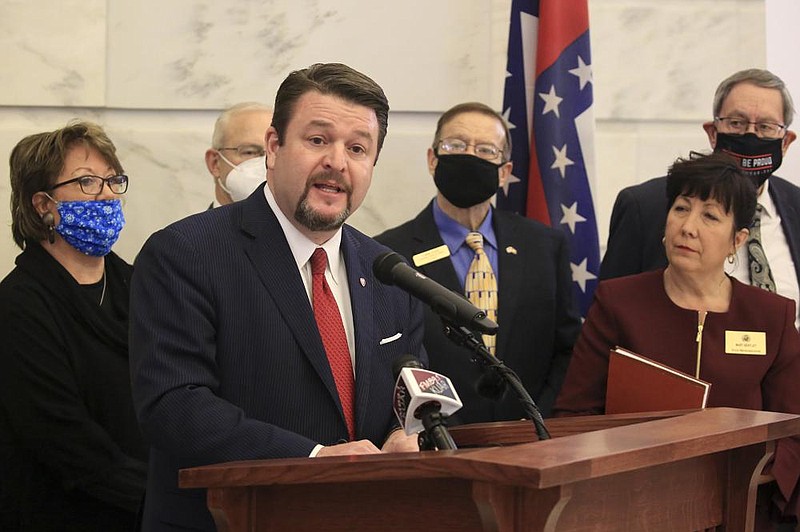The Arkansas Senate overwhelmingly approved a near-total ban on abortions Monday, sending to the House a bill that would prohibit the procedure in all cases except to protect the health and life of the mother.
Senate Bill 6, by state Sen. Jason Rapert, R-Conway, is one of several anti-abortion measures being considered by state legislatures that seek to force the U.S. Supreme Court to reconsider its long-standing precedent upholding the right to have an abortion.
If SB6 becomes law, then it will face a swift legal challenge, the American Civil Liberties Union of Arkansas has warned.
Some opponents of abortion -- concerned that a challenge to the precedent of Roe v. Wade could fail -- have also expressed trepidation over the bill, and Republican Gov. Asa Hutchinson has not said whether he will sign it.
On Monday, two senators opposed to abortion sought unsuccessfully for the bill to be amended to include exceptions for rape and incest, which Rapert said he did not want included in the bill.
After more than an hour of debate, the Senate voted mostly along party lines, 27-7, to send the bill to the House.
"It is past time for us to abolish abortion," Rapert said in a speech on the Senate floor in which he referred to abortion as a "crime against humanity."
In addition to the prohibition on abortions, SB6 would penalize anyone who performs an illegal abortion with up to 10 years in prison and a $100,000 fine. Women who receive abortions in violation of the law would not be subject to criminal penalties.
State Sen. Jim Hendren, an independent from Sulphur Springs who last week announced his departure from the Republican Party, had proposed an amendment to add exceptions for rape and incest, which he said had been a part of most other anti-abortion measures passed since the Roe decision.
"That's a problem for me and several others who have voted for such amendments for decades," Hendren said.
Hendren was joined by state Sen. Missy Irvin, R-Mountain View, who asked Rapert to pull down the bill and amend it, saying, "I have no idea why we can't reason together."
Rapert responded to the senators' remarks, saying SB6 did allow for emergency contraception that could be used by rape and incest victims.
During the roll call, Hendren voted "present" while Irvin voted for the unamended bill. Senate President Pro Tempore Jimmy Hickey, R-Texarkana, was the only Republican to vote against the bill, while state Sen. Larry League, D-Nashville, voted for it.
Democrats who lined up to speak against the bill objected to Republicans' depiction of their concerns, and said the bill would do little more than force women to seek dangerous and unregulated abortions.
"Roe v. Wade, it has been said, did not cause abortion, it made it safe, whether you agree with it or not," said state Sen. Linda Chesterfield, D-Little Rock. "When I was growing up, we always heard the stories about the clothesline and the Clorox because that was what was used to induce abortion. And so what we're advocating now is going back to clotheslines and Clorox."
In a statement released by his office Monday, Hutchinson expressed support for amending the bill to include exceptions for rape and incest, but did not say whether he would veto a bill without such an amendment.
"The legislature has historically included rape and incest as exceptions to abortion prohibitions," Hutchinson said in the statement. "It makes sense to add the exceptions because if you are going to challenge Roe v. Wade, then it is important to have exceptions that the public generally supports."
Rapert said Monday he had spoken with the governor regarding his concerns since SB6 was passed unanimously out of a Senate committee earlier this month. Rapert noted that the Legislature passed a similar "trigger" abortion ban in 2019 that did not include exceptions for rape or incest and would go into effect only if the Supreme Court overturned Roe v. Wade. Hutchinson did not veto the 2019 law.
"The governor has not made any demands of me at this point," Rapert said. "And I hope that he would be able to sign the bill."
In a separate action Monday, the Senate Committee on Public Health, Welfare and Labor endorsed a bill that would require a doctor or qualified technician to display ultrasound images to a woman before an abortion.
Senate Bill 85, by Sen. Cecile Bledsoe, R-Rogers, was passed unanimously by the all-Republican committee, over the objections of three women who spoke against the bill.
State law now requires an ultrasound prior to an abortion but gives the patient the option to view the ultrasound.
Ali Taylor, co-founder and president of the Arkansas Abortion Support Network, said SB85 "is just another attempt by the state to enact onerous regulations on a safe, legal medical procedure."
"I always find it a little ironic that so many members of this legislative body claim to hate big, bad government regulation, except of course when it comes to pregnant bodies," Taylor said. "It seems that there is no government regulation that is too big when it comes to controlling pregnant women."
According to the Arkansas Department of Health, there were 2,963 abortions performed in the state in 2019. State law allows abortions up to the 20th week of pregnancy.
Information for this article was contributed by Michael R. Wickline of the Arkansas Democrat-Gazette.
